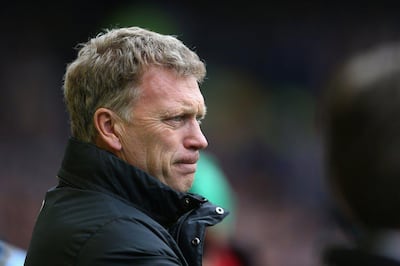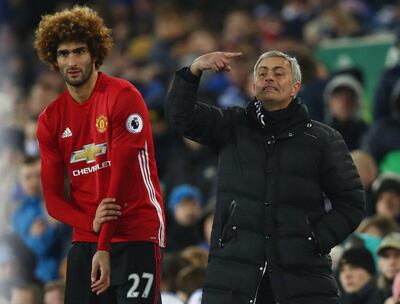“Everybody knows Marouane is not Maradona,” Jose Mourinho said in November.
It was undeniable. And yet, as Marouane Fellaini prepares to leave Old Trafford after a tumultuous, strangely triumphant time, there is a comparison to be made with George Best. Not in terms of style of play or talent, obviously, but Best was the last player to define four managers’ reigns at Manchester United.
Until, arguably, Fellaini.
David Moyes’ first major signing appeared an indictment of the Scot, importing Everton’s limitations when United wanted excitement, creativity and class in central midfield. He was a symbol of lumpen, laboured, failing football, even of transfer-market failings when United paid £4 million (Dh19m) more than they needed to after a release clause expired a month before they bought him.
Had Fellaini left with his mentor, it would have been as a disaster.

If the rejuvenation of a player who has been both jeered and cheered by United fans is a testament to his character, it also confounded expectations. Louis van Gaal was the supposed purist who formed a distinctly pragmatic attachment to the Belgian; Mourinho the serial winner who turned to the ungainly Fellaini to get victories.
He felt a crutch to very different managers. Both omitted marquee signings, from Angel di Maria and Radamel Falcao to Paul Pogba and Henrikh Mkhitaryan, at points when Fellaini was instead central to their gameplan.
And then he assumed a different figurative role in Ole Gunnar Solskjaer’s United. The reliance on Fellaini was removed at a stroke. He was a symbolic sacrifice, conspicuous by his absence as United were faster and more fluent without him.
A team more in keeping with the club’s attack-minded past was fashioned minus a footballer who it was hard to envisage in Matt Busby or Alex Ferguson’s best sides.

If Fellaini, with his limitations, held United back, he was also a damage-limitation specialist. If he stopped their football getting better, there was many a time he stopped things getting worse, and not merely because, in times of need, Mourinho tended to summon Fellaini for a late, unashamedly direct assault.
The Fellaini era, a five-and-a-half-year period when he played 177 times, was United’s bleakest period for three decades. And yet he has merits much of the credit for the highs.
He was terrific in Van Gaal’s spring surge to fourth place in 2015, scoring against Tottenham Hotspur and Manchester City. He was, along with Pogba, Mkhitaryan and Marcus Rashford, one of the architects of Mourinho’s 2017 Europa League win. A man with a magnetic chest, jutting elbows and huge hair set a particularly Fellaini-esque record in the final against Ajax, winning a Europa League number of headers in one game.
United won three major trophies in Fellaini’s time. He scored in the semi-finals of each, the FA Cup, the League Cup and the Europa League. After that wretched first season, he had a capacity to make important contributions.

He became Van Gaal and Mourinho’s favoured lieutenant, trusted to follow unglamorous instructions. He felt among the last loyalists of two ultimately discredited regimes. The break with the past was signalled when Solskjaer engineered a fightback against Burnley on Tuesday without recourse to Fellaini; at 2-0 down, Mourinho would have prepared an aerial assault.
Now Shandong Luneng beckons. If the prospect of Fellaini in the Chinese Super League feels odd, he was an atypical United player, fitting scarcely with their past or modern football.
With Fellaini pivotal, United looked the ugly anomaly among more aesthetically pleasing sides. Yet he had an idiosyncratic brand of effectiveness which means that, as he goes, it is with some tributes and gratitude.
Which would once have felt impossible.


